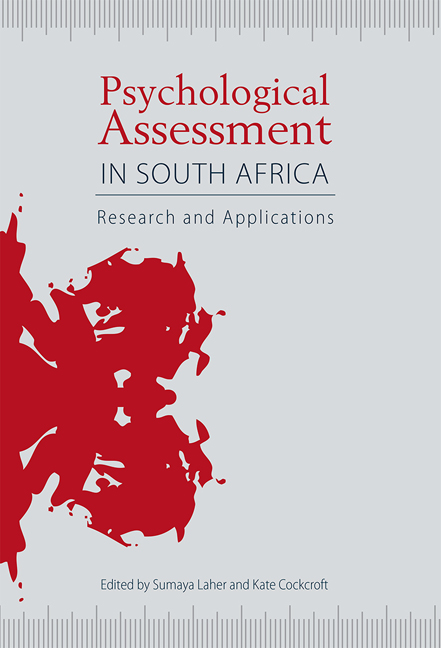Book contents
- Frontmatter
- Contents
- Tables and figures
- Acknowledgements
- Acronyms and abbreviations
- 1 Contextualising psychological assessment in South Africa
- Section One Cognitive tests: conceptual and practical applications
- Section Two Personality and projective tests: conceptual and practical applications
- 14 The Sixteen Personality Factor Questionnaire in South Africa
- 15 Using the Fifteen Factor Questionnaire Plus in South Africa
- 16 The Basic Traits Inventory
- 17 The Myers-Briggs Type Indicator® in South Africa
- 18 The NEO-PI-R in South Africa
- 19 Using the Occupational Personality Profile in South Africa
- 20 The Occupational Personality Questionnaire
- 21 The Millon Inventories in South Africa
- 22 Assessment and monitoring of symptoms in the treatment of psychological problems
- 23 Assessment in routine clinical and counselling settings
- 24 Projective assessment of adults and children in South Africa
- 25 The use of the Children's Apperception Test and Thematic Apperception Test in South Africa
- 26 Projective assessment using the Draw-A-Person Test and Kinetic Family Drawing in South Africa
- 27 The Rorschach in South Africa
- Section Three Assessment approaches and methodologies
- Contributors
- Index
22 - Assessment and monitoring of symptoms in the treatment of psychological problems
from Section Two - Personality and projective tests: conceptual and practical applications
Published online by Cambridge University Press: 21 April 2018
- Frontmatter
- Contents
- Tables and figures
- Acknowledgements
- Acronyms and abbreviations
- 1 Contextualising psychological assessment in South Africa
- Section One Cognitive tests: conceptual and practical applications
- Section Two Personality and projective tests: conceptual and practical applications
- 14 The Sixteen Personality Factor Questionnaire in South Africa
- 15 Using the Fifteen Factor Questionnaire Plus in South Africa
- 16 The Basic Traits Inventory
- 17 The Myers-Briggs Type Indicator® in South Africa
- 18 The NEO-PI-R in South Africa
- 19 Using the Occupational Personality Profile in South Africa
- 20 The Occupational Personality Questionnaire
- 21 The Millon Inventories in South Africa
- 22 Assessment and monitoring of symptoms in the treatment of psychological problems
- 23 Assessment in routine clinical and counselling settings
- 24 Projective assessment of adults and children in South Africa
- 25 The use of the Children's Apperception Test and Thematic Apperception Test in South Africa
- 26 Projective assessment using the Draw-A-Person Test and Kinetic Family Drawing in South Africa
- 27 The Rorschach in South Africa
- Section Three Assessment approaches and methodologies
- Contributors
- Index
Summary
Although the clinical interview is the foundation of assessment for individuals presenting with psychological problems (Edwards & Young, chapter 23, this volume), information from self-report scales provides valuable complementary information. Many self-report scales developed in North America and Britain are used regularly in South Africa with clients from a spectrum of cultural backgrounds. Some have been translated into South African languages, while others may be translated on the spot by the clinician or an assistant during the assessment process. Yet translation of scales, or importing them into cultural contexts different from those in which they were developed and validated, poses a number of problems that may be sufficient to throw doubt on their validity. There has been limited research on this in South Africa, and this chapter will examine the problems involved and the conclusions that can be drawn from existing research with respect to the value in local clinical settings of self-report scales developed overseas.
The role of self-report scales in clinical assessment
Self-report scales can be used in a number of ways during the initial assessment of a case, and as part of the ongoing assessment that continues throughout treatment and even afterwards. Their main applications will be examined in this section.
Determining presence and severity of a clinical problem
A wide variety of specialised scales that tap the specific cognitive, emotional and behavioural aspects of common clinical problems have been used in South Africa, both clinically and in research studies. These include, for example, the Beck Anxiety Inventory (BAI) for anxiety and panic (Beck & Steer, 1993), the Beck Depression Inventory-II (BDI-II) for depression (Beck, Steer & Brown, 1996), and the Post-traumatic Diagnostic Scale (PDS) for post-traumatic stress disorder (PTSD) (Foa, Cashman, Jaycox & Perry, 1997). Scales like these are usually validated in the USA or the UK. On the basis of normative data from these validation studies, cut-off points are determined which act as a guide to clinicians as to whether the symptoms are within the normal range, or whether they point to a mild, moderate or severe degree of clinical concern.
- Type
- Chapter
- Information
- Psychological Assessment in South AfricaResearch and Applications, pp. 307 - 319Publisher: Wits University PressPrint publication year: 2013



